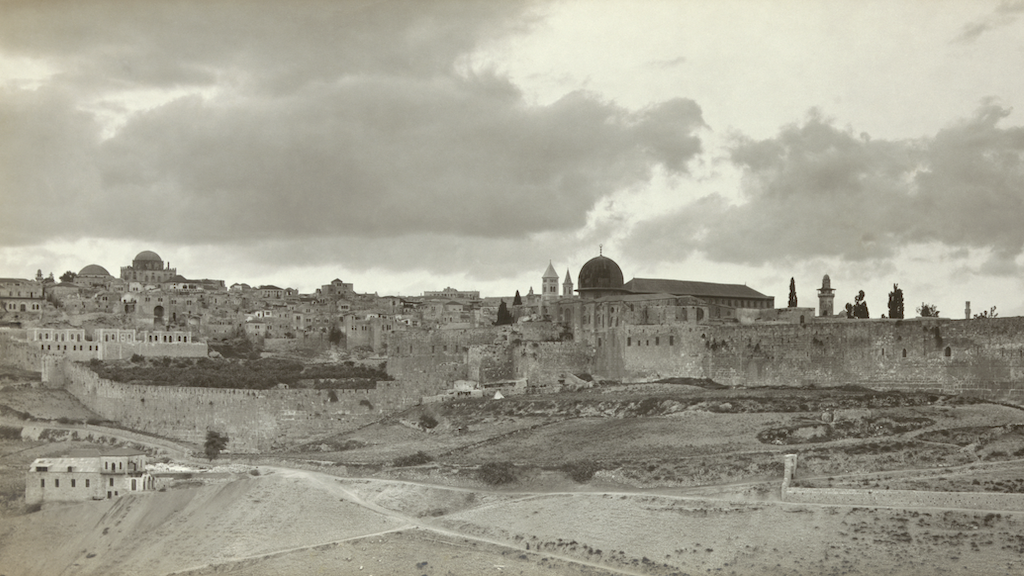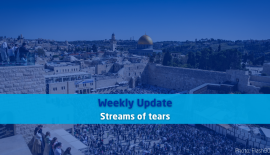In the Beginning: The History of Jerusalem—Part 1
Thus say the Lord God; This is Jerusalem: I have set it in the midst of the nations and countries that are round about her—Ezekiel 5:5
It is arguably the most famous city in the world—a household name even in remote places like the highlands of Papua New Guinea or the jungles of the Amazon. It has four thousand years of history of which the first thousand was heathen, the second thousand Israelite, the next two thousand Gentile, and then after the June War of 1967, the city returned to Jewish/Israeli rule.
This six-part series will look at Jerusalem—historically and prophetically. When we understand Jerusalem, we better comprehend the will of God.
Bird’s Eye View
The very first time Jerusalem is mentioned in the Bible by name is in Joshua 10:1. Adonizedek formed a coalition against the royal city of Gibeon, for having the audacity of making a league with Joshua and Israel. He is referred to as ‘king of Jerusalem’.
Despite its lack of mention in the Torah, (the first five books of the Bible), Jerusalem is undoubtedly the chief city of the Bible. It’s explicitly named 811 times. In addition, it has other names like:
- City of God (Psalm 46:4; 87:3)
- City of David (2 Samuel 5:7; Isaiah 22:9)
- Jebus (Joshua 18:28; Judge 19:10)
- City of Righteousness (Isaiah 1:26)
- City of Truth (Zechariah 8:3);
- City of the Great King (Psalm 48:2);
- Holy City (Nehemiah 11:1)
- Faithful City (Isaiah 1:21,26)
- Salem (Genesis 14:18; Psalm 76:2)
- Holy Mount (Daniel 9:16)
- Perfection of Beauty (Lamentations 2:15)
- Throne of the Lord (Jeremiah 3:17)
- Egypt & Sodom (Revelation 11:8)
- Zion (1 Kings 8:1; Zechariah 9:13).
When you tally up the references, it amounts to a 1000 times Jerusalem and its synonyms are found in Scripture. In contrast, the city of Babylon—the spiritual rival to Jerusalem—is cited 252 times.
The Glory of Zion
It is impossible to understand Jerusalem’s significance without mentioning Zion. Are Jerusalem and Zion the same thing or are they distinct?
The name ‘Zion’ needs special emphasis. It is often associated with ‘Zionism,’ though ultimately it has a spiritual, prophetic side that is above politics. Zion has several meanings in Scripture, depending on the context. The word is used 152 times in the Bible, along with ‘Sion’ nine times.
- Zion can mean the city of Jerusalem (Psalm 87:2-3; 48:1-4);
- Zion can mean the land of Israel (Isaiah 51:3);
- Zion can mean the Jewish people (Isaiah 51:16);
- Zion can mean Salem, which is equal to Jerusalem (Psalm 76:1-3).
Thus, while Zion’s exact meaning is uncertain, it has become synonymous with Jerusalem, Israel, and the Jewish people. Significant as these points are, Zion goes to a whole new level when referring to Almighty God Himself.
Psalm 132 gives great insight into the significance of ‘Zion.’ We learn that God has chosen it (verse 13), desires it as His habitation (verse 14)—His local earthly address; He desires it as his final abode above all other places (verse 14); the lamp of God’s anointed (David and Messiah, son of David) will be there.
In light of Psalm 132, and other Scriptures, Zion’s greatest glory is this: It is associated with God’s literal dwelling place on earth; His local earthly snail mail address. The phrase, ‘The Lord Dwells in Zion’ is found in the following verses: Psalm 9:11; Psalm 135:21; Isaiah 8:18; Joel 3:21; Isaiah 33:5.
In summary, Zion appears to be a royal city, or at least the royal section of the city, where the King of Israel will live. Zion/Jerusalem is a holy city, where the God of Israel dwells, too. Messiah is the Son of David and Son of God, the heir who will sit on David’s throne and rule from the holy city.
Since God has chosen Zion for Him and His King to dwell, you can be sure that the forces of darkness will do their utmost to foil the divine plan. If it were possible, they will try to keep the King out of Zion. In Psalm 2 and Zechariah 12, 14, we begin to see a picture of why the nations are so restive and concerned about Jerusalem. These passages are the beginning of understanding why Jerusalem is the burdensome stone. Either Zion will be God’s capital or that of an anti-God, anti-Christ force.
The First Thousand Years (2000-1000 BC)
While the first millennium of Jerusalem was not in Israelite hands, it is mentioned by implication in the following events:
- Melchizedek, king of Salem, welcomed the patriarch Abraham after the slaughter of the kings. He was a priest of the Most High God (Genesis 14:18-20).
- Isaac’s near-death experience occurred in the ‘land of Moriah,’ traditionally considered Mount Moriah, Jerusalem.
- Joshua’s conquest of Canaan: Information was sparse, but we learn that Judah did not drive out the Jebusites, inhabitants of Jerusalem (Joshua 15:63) and neither did Benjamin (Judges 1:21);
- Alternatively, Judah destroyed Jerusalem by fire (Judges 1:8) but did not retain it. Then the Jebusites inhabited it afterwards.
- In short, neither Joshua, the judges, nor king Saul succeeded to capture and keep Jerusalem. That honour would be left for a man called David.





